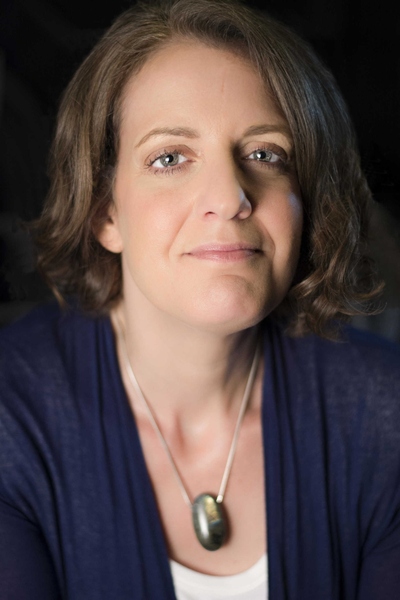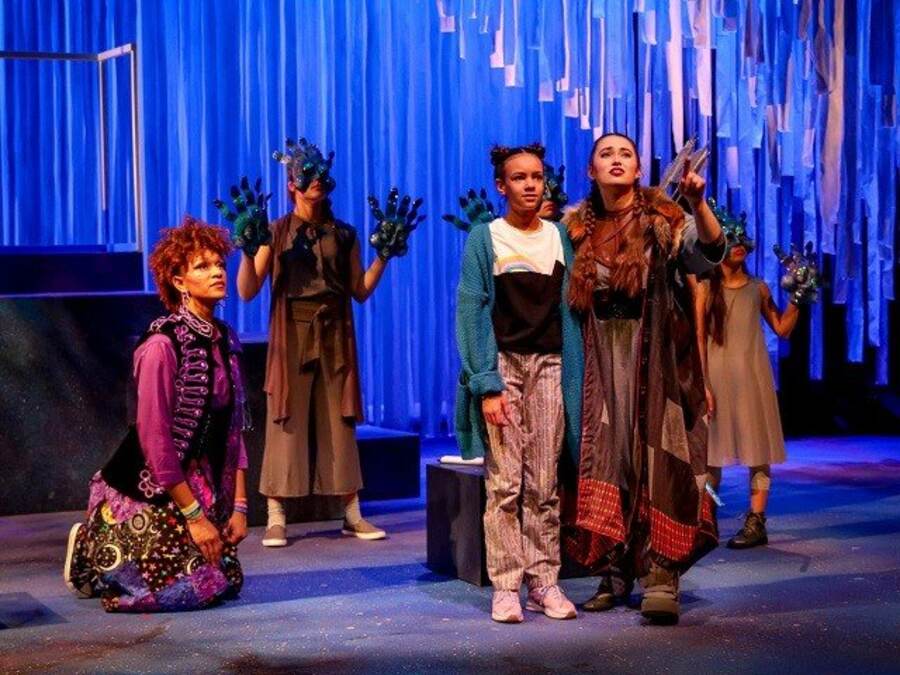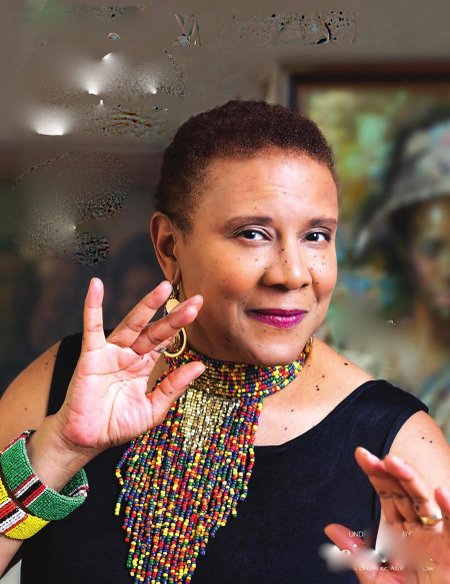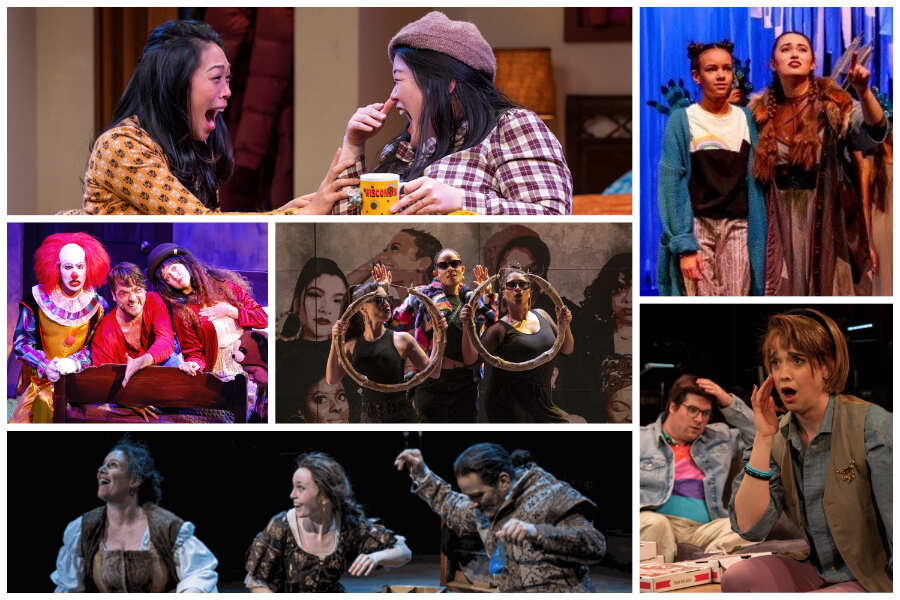It seemed fitting that the night of World Premiere Wisconsin’s kick-off party at Ten Chimneys, the historic estate of theatre legends Alfred Lunt and Lynn Fontanne, began with a massive February snowstorm. Equally fitting: That weather event didn’t stop Wisconsinites from coming out in droves to celebrate this first-of-its-kind project, which began March 1 and runs through June 30 at a variety of venues across the state. If a global pandemic couldn’t halt the forward momentum of this festival, snow certainly wasn’t going to either.
World Premiere Wisconsin (WPW) first began gestating in 2018 as the brainchild of Jen Uphoff Gray, artistic director of Madison’s Forward Theater Company. The idea came to her after attending a Statera Conference in Milwaukee and hearing NNPN executive director Nan Barnett talk about the Women’s Voices Theatre Festival in Washington, D.C.
“As I listened to her speak, I thought about the needs of our theatre ecosystem here in Wisconsin, and about the different ways I and others had tried over the years to bring our many companies together,” Gray wrote in a Facebook post. “My brain was working on two tracks simultaneously: One half was listening to Nan and taking notes. The other half was already envisioning a Wisconsin festival.” By the time the session ended, Gray said she turned to Julie Swenson, Forward Theater’s managing director, who was sitting next to her, and uttered the words, “World Premiere Wisconsin.”

Gray knew she wanted Wisconsin’s flagship theatre involved in the festival, and that’s where I initially came in. In 2019, while I was still on staff at Milwaukee Repertory Theater, I joined the leadership team for WPW (Laura Braza, Milwaukee Rep’s associate artistic director, later joined the team as well). We then brought on Molly Rhode, associate artistic director of Northern Sky Theater, so that Wisconsin’s three largest theatre communities—Madison, Milwaukee, and Door Country—all had representation with WPW. The leadership team was formed. But, as Gray will attest herself, the festival’s success so far is thanks to the dozens of organizations across the state who have rallied behind it.
“From the beginning, the vision was to include theater companies of all kinds in WPW,” Gray said, “professional companies, semi-professional companies, community theatres, youth theatres, academic theatres.”
We developed three ways to participate in the festival: Lead Producers (Forward, Milwaukee Rep, and Northern Sky), who committed a significant amount of staff time toward organizing WPW, from inception through implementation; Festival Theaters, professional companies who committed to a full world premiere production during the festival, as well as supporting the project with finances, planning, marketing, and development; and Participating Theaters, which included any company or theatremaker in Wisconsin who would commit to producing a world premiere production, workshop, or staged reading during the festival months.
The festival not only had three levels of participation. It also had three goals: to build relationships among theatremakers across the state, to raise national awareness about Wisconsin’s thriving theatre ecosystem, and to encourage the production of new work. We leapt into the first goal immediately, gathering all Festival Theatres at Ten Chimneys in spring 2019. That initial meeting led to continued email conversations, building collaboration and community among the Festival Theaters.
But then the world shut down in March 2020. Such a cataclysmic event could easily have pushed us apart. Instead, it made us stronger. Email conversations turned, as everything did, into weekly Zoom calls, and the theatres used this already established camaraderie to discuss everything from COVID policies to We See You, White American Theater and budget concerns. Because of the pandemic, a fourth festival goal was added: to communicate a positive story about theatremaking in Wisconsin during a critical phase of recovery and rebuilding.
Fast forward two years, and that last goal has been very much achieved. From March through June, nearly 50 new play projects will have been produced in over 20 communities across the state, at organizations ranging from LORT B theatres to college drama departments.

The first slate of World Premiere Wisconsin productions showcased the variety and quality of what Wisconsin has to offer. The festival line-up kicked off with Lloyd Suh’s commission from Milwaukee Rep, The Heart Sellers, which explores the budding friendship between two recent U.S. immigrants in the 1970s, one from Korea and the other from the Philippines. The night I saw it—amid yet another snowstorm—the audience laughed and cried in equal measure.
It’s no surprise that Milwaukee, being the state’s most populous city, is strongly represented in the WPW roster. At Milwaukee Chamber Theater was HOOPS, written by Eliana Pipes and based on the Hoops Project by Milwaukeean Nicole Acosta, with original music by B~Free. Composed of music and interviews, HOOPS explored the history and cultural significance of hoop earrings, in the vein of The Colored Museum and Single Black Female. Acosta welcomed the audience with a curtain speech encouraging authentic in-the-moment responses to the show, and we took her up on that, singing, dancing, and cheering along with the actors. I left the theatre feeling rejuvenated to my core.
I also visited Milwaukee’s Florentine Opera Company to attend only my second opera. Così fan tutte: REMIX was an English-language adaptation of Mozart and Da Ponte’s original, now set in a college union, jumping between 1984 and 2004. Adapted by Nicolas Lell Benavides and Kelley Rourke, this world premiere welcomed both newbies and aficionados with a modern and accessible piece that honored the beloved story and music.
Not to be outdone by Milwaukee, Madison’s theatre scene has come out in full force for the festival. In one day, I was able to catch a matinee of Capital City Theatre’s clever Shining in Misery: A King-Sized Parody—perfect for musical theatre nerds and Stephen King fanatics alike—and Children’s Theater of Madison’s (CTM) visually stunning production of Finder and the North Star.
The development of Finder and the North Star began outside of Wisconsin, but writer Erica Berman was grateful to have the world premiere at CTM, her “artistic home,” especially at a time when many theatres are struggling to produce at all. “Producing new work is an act of bravery and a leap of faith for any theatre,” said Berman. “WPW has encouraged theatremakers and theatregoers alike to take a chance, take a risk, and celebrate the new and not yet known.”
One of the festival’s strengths has been getting audiences to see shows they wouldn’t have otherwise seen, and to visit parts of the state they don’t get a chance to frequent. Even though my work is theatre and I’ve lived in Wisconsin for a good portion of my life, I don’t get to see as many shows outside Milwaukee as I would like. WPW encouraged me to make the 90-minute drive (through snow, of course) to Madison to see two shows that may not have been on my radar.
One way WPW is encouraging attendance is via a festival “passport,” a site which offers audiences across the state exclusive discounts on shows, as well as the chance to earn points for attending productions, which they can cash in for WPW swag. With world premieres also happening in Kenosha, Spring Green, Fond du Lac, Green Bay, and further afield, WPW is an opportunity for Wisconsonites to check out not only each other’s theatres but also our various cities.
An East Coast transplant to Wisconsin, Berman said she was excited by the state’s theatre scene. “I was blown away by the consistently high level of theatre experiences that Wisconsin has to offer. As an audience member, I love the wide range of diverse stories that I see produced on Wisconsin stages. As a theatre practitioner, I have found the Wisconsin arts community inclusive, innovative, and invested.”
“A vibrant arts community makes our state a better place to live, work, and play, and it is crucial in retaining great artistic talent as well,” said United Performing Arts Fund (UPAF) CEO and president Patrick Rath. “Just in Southeastern Wisconsin alone, there are more than 2,000 artists who are full-time performers thanks to the robust cultural scene we have.”
UPAF, a nonprofit that raises funds for performing arts organizations in Southeastern Wisconsin, sponsored Milwaukee Journal Sentinel’s former chief theatre critic Mike Fischer to write introductory articles about every WPW production. Amid diminishing arts coverage across the state, Fischer’s interviews have been crucial in spreading the word about the festival.

Funding a festival of this size and scope hasn’t been easy. WPW got its start thanks to donations from festival partner Ten Chimneys, Forward Theater board members, and each of the Festival Theaters. These funds were enough to launch a website and hire Michael Cotey, a Wisconsinite director who also produces the nationwide theatre activism initiative, ENOUGH! Plays to End Gun Violence, as festival producer.
The biggest boon to the festival came in the form of a Joint Effort Marketing (JEM) grant from Travel Wisconsin. Thanks to its unique festival structure, WPW was able to apply for a highly competitive grant and received the full amount available. While individual productions are funded by their producing organization, the JEM grant has funded producing and marketing needs, which supported all of the productions under the WPW umbrella.
This is against the backdrop of a bleak arts funding picture. While Milwaukee County ranks in the 1 percent nationally for private sector arts funding, public funding for theatre is seriously limited, and nonexistent for new-works initiatives.
“Arts funding in Wisconsin, and specifically in Milwaukee, is almost completely dependent on private sources,” said Chad Bauman, Milwaukee Rep’s executive director. “When it comes to per-capita public funding for the arts and culture, Wisconsin currently ranks 50th nationally. Over the last nine years, Wisconsin has maintained a consistent bottom-five national ranking.” In an appeal at the Wisconsin Joint Finance Committee Meeting, Bauman said, “We seemingly have not discovered what every other state in the nation has. Public support for the creative economy is not an expense—it is an investment that returns significantly more revenue to the state than the expenditure.”
That’s why WPW’s goal of raising awareness of the incredible work being done in the state is more important than ever. “World Premiere Wisconsin is important because, to my knowledge, it is the first state-wide theatre festival in the United States,” said Bauman, who went on to hail it as a way to “maximize our collective resources, attract tourists, and use theatre to engage our communities in a post-pandemic world. As theatres across the country are starting to significantly cut programming and risk, Wisconsin theatres are going big with a bold new program that will drive confidence in our audiences and artists.”
Rath concurred, saying, “World Premiere Wisconsin has demonstrated that our state is a place where collaboration thrives and new works are embraced. This festival is positioning our state not only as a place where playwrights and directors want to produce, but also where artists have the ability to be on the ground floor of creation. The relationships built between theatre organizations statewide as a result of the World Premiere Festival are also what is going to carry our state’s art scene further—we are made better because of one another, so unity created through efforts like this festival will lead to a stronger ecosystem overall.”
Admittedly, Wisconsin may not be the first state that comes to mind when you think about theatre, much less world premiere plays. But if the nearly 50 companies involved in WPW prove anything, it’s that theatre is very much alive here—and that locally focused, innovative work is our bread and butter (or cheese and sausage).

“I hope WPW raises the awareness of the tremendous talent which exists across Wisconsin and the robust theatre districts in Milwaukee,” said native Wisconsinite Sheri Williams Pannell. Pannell is the artistic director of Bronzeville Arts Ensemble, a producer for Black Arts MKE, and co-writer and director of WPW piece Zuri’s Crown. “The people of our city and state are generous and love the arts. Every theatre represented in WPW proves this to be true.”
Like many theatres across the state, Bronzeville has been producing new work since its inception. While Zuri’s Crown was programmed prior to the company joining WPW, she hopes the festival will bring in audiences who’ve never seen a show at Bronzeville. Zuri’s Crown, which starts performances on April 27, is one of many shows still to premiere between now and the festival’s conclusion at the end of June.
As summer approaches, locals and tourists alike know the place to be for theatre is the Door County peninsula. Three theatre companies there are part of World Premiere Wisconsin (in addition to Northern Sky, they are Peninsula Players and Third Avenue PlayWorks). Northern Sky frequently develops new work by local artists, and in June will be premiering a new musical, the delightfully named The Fish Whisperer.
Last but not least, what about Jen Gray and Forward Theater’s own contribution to the festival?
“I’d known from the moment I dreamt up WPW that our ideal premiere would be a Lauren Gunderson commission,” wrote Gray. “I loved her work, I loved her characters, and I loved how her plays enthralled and activated our audiences.” The result is Artemisia, Gunderson’s cheeky, powerful exploration of the life and work of 17th-century Italian painter Artemisia Gentileschi, which runs through the end of April.
Gunderson has worked with Forward Theater on several productions over the years, and visited in summer of 2022 to workshop Artemisia as part of Forward’s Wisconsin Wrights Festival.
“What I’ve experienced at Forward Theater is a thirst and passion for all the challenging and exciting steps of making important new American plays,” said Gunderson. “It’s always a risk to commission and produce a world premiere; it takes more money and time and less surety than any other forms of play production. But that drive and faith in theatre are how the great new ideas are born. I have found that capacity, curiosity, and commitment in Wisconsin.”
For those who braved the weather, WPW’s kick-off party at Ten Chimneys featured an excerpt from Artemisia, as well as several other Festival Theater shows. There was also a welcome surprise: a proclamation from Wisconsin Gov. Tony Evers declaring March 1, the official start of the festival, World Premiere Wisconsin Day. It was impossible not to see the pride, excitement, and joy on the faces of the regional, community, and college theatre leadership as they read the proclamation out loud. Perhaps people didn’t know about Wisconsin’s thriving theatre scene before—but now they will. And hopefully what happens in our state will, as Cotey said in a speech at the party, “set an example of what’s possible in the spirit of collaboration.”
Said Gunderson, “I have worked predominantly in regional theatre, and know that great new plays emerge everywhere across the country, and that those players can and should have long lives across the country and in the world. Because every town that celebrates, supports, and nourishes new plays is a theatre town. That’s what I hope World Premiere Wisconsin proves.”
Deanie Vallone (she/her) is a freelance writer and dramaturg, and serves on the leadership team for World Premiere Wisconsin. Previously, she was the literary director at Milwaukee Repertory Theater, where she oversaw their new-play development and dramaturgy initiatives. She has written for The Independent, HowlRound, Jumeirah Magazine, and other publications.


